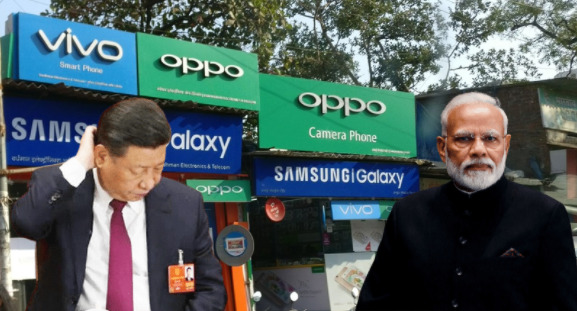Last year, the Modi government took one bold step- a total of around 267 China-based apps were banned in several phases. The apps ban was intended to secure the personal data and privacy of Indian mobile users. Yet, the concerns regarding the privacy of the users remain since the Indian market is still dominated by Chinese mobile handsets.
Chinese mobile brands are monopolising the Indian Smartphone market:
China has flooded India with its smartphones. Chinese smartphones are a big hit in India, due to the extremely cheap prices which companies like Xiaomi, Realme, Oppo, Vivo, OnePlus and others offer. Due to their market flooding tendencies, Chinese smartphones were becoming competition killers for companies like Samsung, Apple and other Indian smartphone brands like Micromax.
The rise of Chinese smartphone brands in India has been quite sudden. Indian mobile brands used to rule the market a few years ago. In 2015, they held a 43 per cent smartphone market share but by 2018, their market share got reduced to a single-digit share. The Chinese mobile brands ate into the market share of Indian smartphone makers.
The sudden growth of Chinese smartphone brands explained:
Tarun Pathak, Associate Director at Counterpoint Research, said, “The Chinese brands had been very aggressive from the very beginning. They were very strong when the transition from 3G to 4G devices was happening.” Pathak added, “Indian brands – such as Micromax – were busy clearing large pile-up of 3G inventory, which was clearly outdated.”
Chinese companies were also quick in bringing in new features 4G, dual camera, fingerprint sensor, or glass-back. Moreover, they were also able to maintain lower prices to attract a wider consumer base. Initially, Chinese smartphone brands used the online model to reduce costs and reach buyers faster.
With such cost-cutting measures, the Chinese smartphone makers muted Indian mobile brands and took over the market. Even the Korean tech giant Samsung has faced a major dent in its smartphone market share in India and, today Xiaomi, a Chinese smartphone maker, leads the market.
Chinese smartphones putting personal data of Indian users at risk:
Chinese smartphones do have lower prices. However, the lower prices are enabled by bloatware, which is a system of pre-installed apps on a smartphone. If you purchase such a mobile handset, you cannot uninstall or even disable such pre-installed apps without compromising on the functionality of your smartphone or exposing it to serious security risks.
The pre-loaded apps can be a significant source of revenue for mobile companies. Take Xiaomi for instance- the Chinese company earned 9.1% of its revenue in 2018 through pre-loaded apps and services.
A paper titled An analysis of Pre-installed Android Software by researchers at the IMDEA Networks Institute explained the risks associated with bloatware. The problem with pre-installed apps is that they consume extra space on your mobile and affect battery performance. More importantly, they have very access to your data, which can be easily misused.
The pre-installed apps have customised permission to your private data on the mobile handset, and it is often way more invasive than the other apps you install from the Play Store. Moreover, you have an opportunity to decide the kind of data you want to share with an app while downloading it, but mostly you may not be even bothered about the data being collected by pre-installed apps.
The paper at IMDEA Networks stated, “These actors have privileged access to system resources through their presence in preinstalled apps but also as third-party libraries embedded in them. Potential partnerships and deals – made behind closed doors between stakeholders – may have made user data a commodity before users purchase their devices or decide to install software of their own.”
Moreover, such pre-loaded apps have also been observed to have embedded third-party libraries like Rootnik. This is a really serious issue as it exposes users to financial fraud.
The curious case of Lithuania:
Recently, Lithuania discovered that a Chinese mobile handset sold in the Baltic nation had an interesting feature- it contained a censorship registry of 449 words that have been banned by the CCP. Lithuania alleged that one Xiaomi phone had in-built censorship features whereas a Huawei model had security issues.
Lithuania’s Defence Ministry also advised consumers to throw away Chinese smartphones.
So, the problem with Chinese mobile brands may no longer be restricted to individual data privacy concerns. The CCP controls the operations of all private companies in China and mobile companies are no exception. With the Xi Jinping administration getting too invasive, even the Chinese smartphones may be faced with Beijing’s tight censors.
The Modi government has banned Chinese apps. However, a bigger task remains unfulfilled- resurrecting Indian smartphone brands, so that they can compete with their Chinese rivals.
